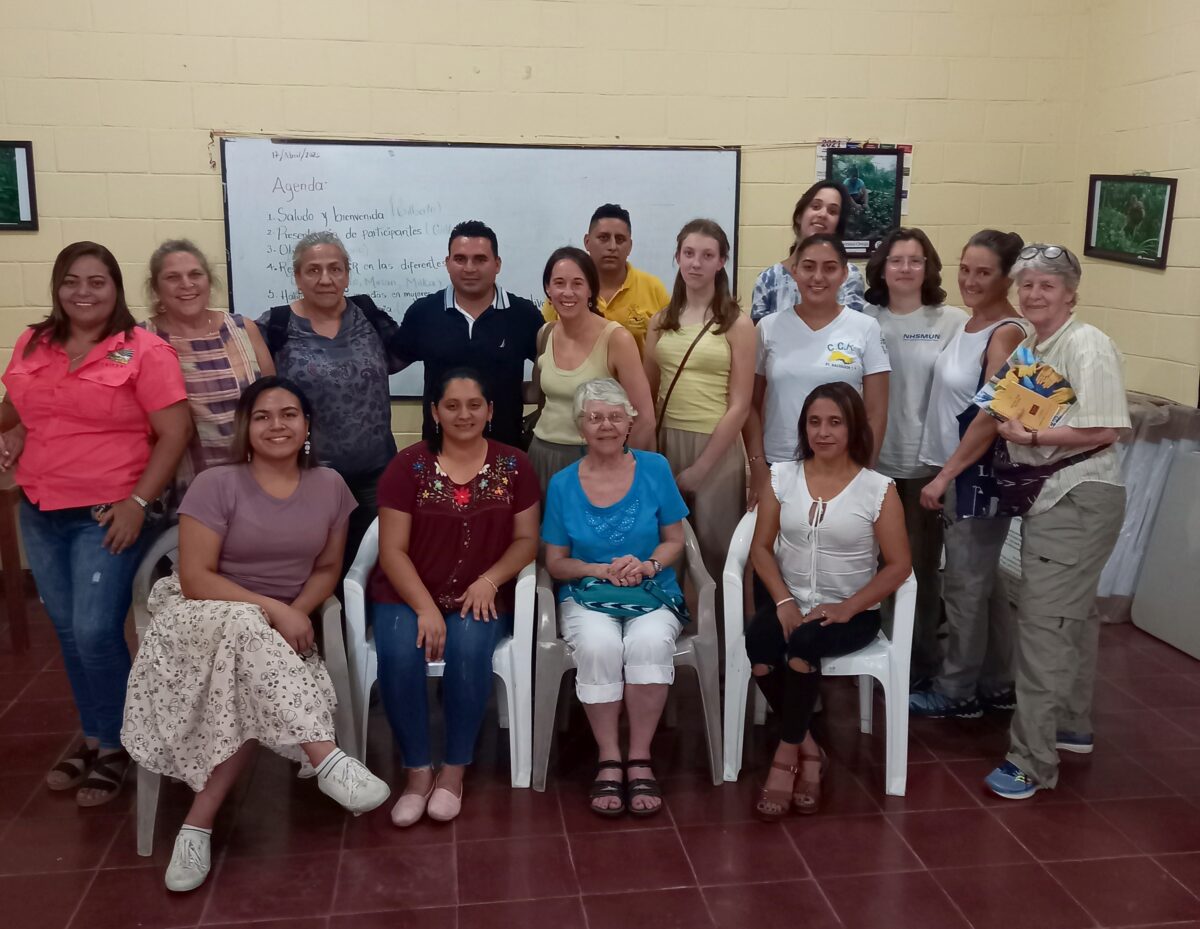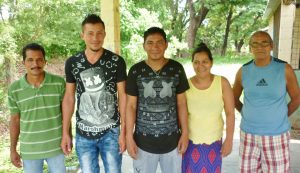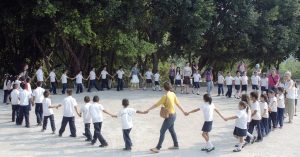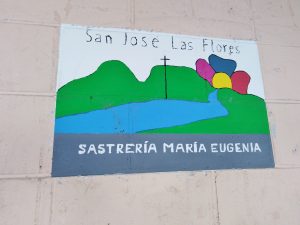Delegations, Human Rights
Sarah Bruhn: reflection after visiting Las Flores / reflexión después de visitar SJLF
(EN ESPAÑOL ABAJO)
Beauty and Connection in Times of Struggle
At dawn, I tiptoed out of the room I shared with a fellow educator and three vivacious high school girls, all of us from the Boston area, all of us grateful for the chance to be in solidarity with the community of San Jose Las Flores. Our days on the delegation were long, and I didn’t want to rob the girls of sleep. But what I wanted was to walk the road leading out of the village, to catch the sun rising over the craggy mountains.
I live and raise my children in Somerville, Massachusetts, a small city outside of Boston that has long welcomed members of the El Salvadoran diaspora. Somerville declared itself a Sanctuary City in 1987, long before the Trump administration’s cruel anti-immigrant policies brought about a rise in the numbers of U.S. cities that declared themselves sanctuaries. For the past five years, I have worked with immigrant women here – over half of them from El Salvador – as I conducted research for my doctoral dissertation, which is the basis for a book I am now writing. Many are undocumented and many struggle to make ends meet. Their migration stories are often filled with sorrow and loss, having left family members behind or living with the knowledge that their belonging in the U.S. is fragile because of their lack of authorization. Yet their stories of home are also filled with beauty and yearning. Their love of El Salvador, even when they hold the struggles that forced them to leave, is strong.
As I walked through the plaza, still cool before the heat of the day settled in, I held these thoughts of home and connection. We had met with organizers and community leaders, people who shared with us how hard things were in this moment, emerging from a global pandemic, battling poverty caused by disastrous governmental policies that strip agency away from local communities, and managing the fear of living under a repressive regime. No one was giving up the struggle for solidarity, collectivity, and power, but things were hard. Water was scarce, jobs scarcer still. Teachers had little say in teaching the history of their resistance, a struggle many of us face in the U.S. Young people were being arbitrarily swept up and imprisoned. Yet as I climbed the hill, greeting other early risers as I went, I was looking for something else, for something that I knew existed, even among the struggle.
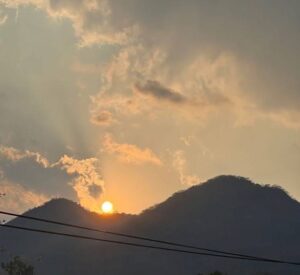
I came to a clearing. A cow nuzzled the fence, letting me know that my presence was not unnoticed. Before me, the mountains were shrouded in a wispy fog, the sun a glowing line of orange in the haze. Even as the clouds obscured the sunrise I had hoped to see, it was breathtakingly beautiful. I took photos, lots of them, knowing full well I wouldn’t really capture the moment, but wanting to try anyway. And then I stood, quietly, hearing the birds arguing loudly in the trees above and the cows, having lost interest, returning to their breakfast.
Soon, the air warmed and the speck of sun rose higher among the fog and I knew it was time to return. Walking back to our hostel, I felt a newfound sense of connection to this place and the many El Salvadoran women who have shared their stories with me here in the U.S. The beauty is visceral. So is the hardship. To be in solidarity, we need to hold onto both.
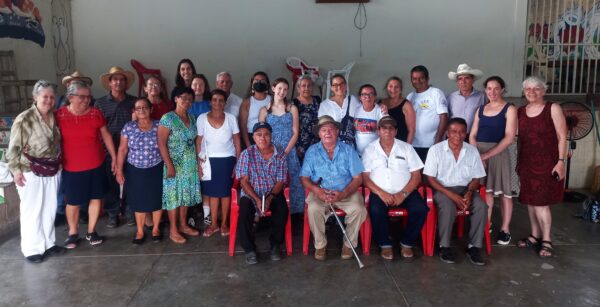
Traducción
Belleza y conexión en tiempos de lucha
Al amanecer, salí de puntillas del cuarto que compartía con una compañera educadora y tres animadas chicas de secundaria, todas del área de Boston, todas agradecidas por la oportunidad de ser solidarias con la comunidad de San José Las Flores. Nuestros días en la delegación fueron largos y no quería interrumpir el sueño de las chicas. Pero lo que yo quería era caminar por el camino que salía del pueblo, para ver el amanecer sobre las escarpadas montañas.
Vivo y crío a mis hijos en Somerville, Massachusetts, una pequeña ciudad a las afueras de Boston que ha recibido durante mucho tiempo a miembros de la diáspora salvadoreña. Somerville se declaró Ciudad Santuario en 1987, mucho antes de que las crueles políticas antiinmigrantes de la administración Trump provocaran un aumento en el número de ciudades estadounidenses que se declararon santuarios. Durante los últimos cinco años, he trabajado con mujeres inmigrantes aquí, más de la mitad de ellas de El Salvador, mientras realizaba investigaciones para mi tesis doctoral, que es la base de un libro que estoy escribiendo ahora. Muchas son indocumentadas y muchas luchan para llegar a fin de mes. Sus historias de migración a menudo están llenas de dolor y pérdida, habiendo dejado atrás a familiares o viviendo con el conocimiento de que su pertenencia a los EE. UU. es frágil por la falta de autorización. Sin embargo, sus historias de hogar también están llenas de belleza y anhelo. Su amor por El Salvador, aun cuando sostienen las luchas que los obligaron a irse, es fuerte.
Mientras caminaba por la plaza, todavía fresco antes de que llegara el calor del día, tuve estas ideas de hogar y conexión. Nos habíamos reunido con organizadores y líderes comunitarios, personas que compartieron con nosotros lo difíciles que eran las cosas en este momento, saliendo de una pandemia mundial, luchando contra la pobreza causada por políticas gubernamentales desastrosas que despojan de agencia a las comunidades locales y navegando el miedo de vivir bajo un régimen represivo. Nadie renunciaba a la lucha por la solidaridad, la colectividad y el poder, pero las cosas eran difíciles. El agua escaseaba, los trabajos aún más. Los maestros pueden opinar poco sobre la enseñanza de la historia de su resistencia, una lucha que muchos de nosotros enfrentamos en los EE. UU. Los jóvenes estaban siendo barridos y encarcelados arbitrariamente. Sin embargo, mientras subía la colina, saludando a otros madrugadores a medida que avanzaba, buscaba algo más, algo que sabía que existía, incluso en medio de la lucha.
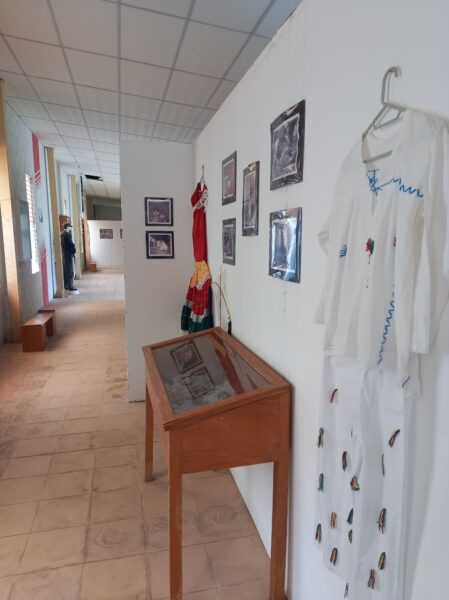
Llegué a un claro. Una vaca acarició la valla, haciéndome saber que mi presencia no pasaba desapercibida. Ante mí, las montañas estaban envueltas en una tenue niebla, el sol era una brillante línea naranja en la neblina. Incluso cuando las nubes oscurecieron el amanecer que esperaba ver, fue impresionantemente hermoso. Tomé muchas fotos, sabiendo muy bien que realmente no capturaría el momento, pero queriendo intentarlo de todos modos. Y luego me quedé, en silencio, escuchando a los pájaros discutiendo en voz alta en los árboles de arriba y las vacas, habiendo perdido interés, volviendo a su desayuno.
Pronto, el aire se calentó y el sol se elevó más alto entre la niebla y supe que era hora de regresar. Al regresar a nuestro albergue, sentí una nueva sensación de conexión con este lugar y con las muchas mujeres salvadoreñas que han compartido sus historias conmigo aquí en los EE. UU. La belleza es visceral. Así es la dificultad. Para ser solidarios, necesitamos aferrarnos a ambos.

